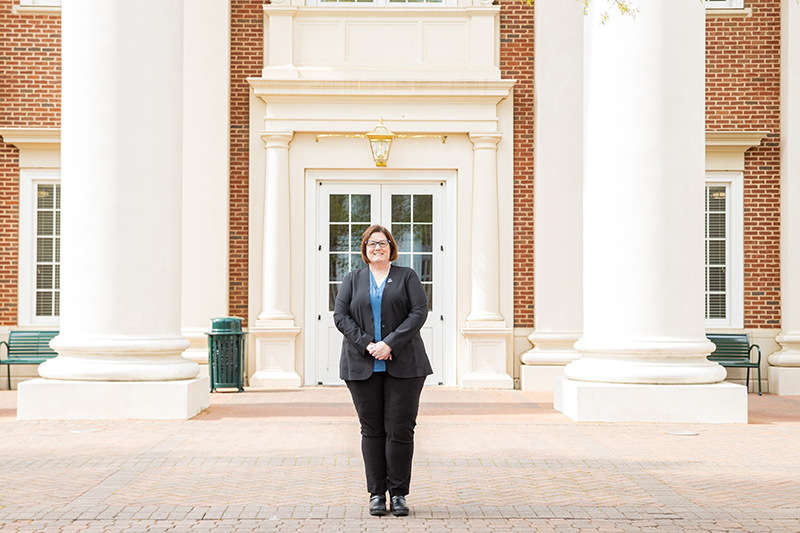
Read time:
Should colleges and universities require applicants for faculty positions to submit a Diversity, Equity and Inclusion (DEI) statement as part of the hiring process?
That is a question Linda S. Ficht, assistant professor of business law in the Luter School of Business, probes in a paper she co-authored, titled “Should DEI Statements be Included in Faculty Selection? Exploring Legal, Diversity, and Validity Issues.”
“Nearly every day since 2021, I’ve noticed articles in the popular press about these topics,” Ficht said. “We noticed that there were no academic papers discussing the legal and managerial issues regarding DEI statements in higher education, so we wrote the paper to fill this gap and start what we believe is an important discussion regarding DEI and DEI statements in hiring.”
The paper, co-written with Dr. Julia Levashina of Kent State University, is published in the International Journal of Selection and Assessment.
The paper studies different approaches to DEI, and the legal and social ramifications of the way statements are used in the hiring process.
When schools require a DEI statement, they generally ask faculty applicants to describe their past record, current actions, and future plans to advance diversity, equity, and inclusion in their teaching, research, and service, according to the paper.
“Typically, applicants are asked to write a one-to-three-page DEI statement,” the paper states.
Ficht believes the impetus for asking for DEI statements is likely due to recent incidents of racism, and efforts to create equality and justice.
“In response to this renewed emphasis on equality, organizations in the United States and abroad are publicly stating their commitment to diversity. Higher education, both public and private, recently began to require DEI statements during the application process for faculty job candidates and in the promotion and tenure process,” the paper says.
The University of California system is one of the academic leaders in the DEI process, with all 10 of its campuses, which encompass approximately 24,000 faculty, 143,000 administrative staff and 286,000 students.
Ficht’s paper examines the pros and cons of schools requiring a DEI statement from their faculty hires.
“Most of the arguments being made claim that DEI statements violate faculty free speech and academic freedom rights, harkening back to the days of required loyalty oaths denouncing communism in the University of California system.
“Despite the fact that this practice is beginning to spread widely throughout academia in the U.S., research on DEI statements as a new selection method is nonexistent,” the paper states. “Thus, the purpose of this paper is to address the gap by describing multiple dilemmas raised due to the use of DEI statements in faculty selection to generate attention, alert US faculty of their rights, explain the phenomena to faculty abroad, and encourage further research interest in this topic.”
Ficht said she is hopeful the paper will help shed light on the issue of the use of DEI statements, and provide schools with both sides of the argument.
“Although we believe that DEI is an important objective in higher education, our research suggests that universities are not always implementing DEI effectively and/or lawfully. We are also seeing a lot of discussion about DEI from a political perspective. When you get politics involved, we believe the discussion becomes emotionally charged and begins to move away from dialogue that can be beneficial to effect change,” Ficht said.
“Thus, we decided write a paper that focuses on the management theory that underlies DEI initiatives in hiring and the law that impacts these initiatives to provide a road map for universities around the globe to effectively, strategically, and lawfully implement well thought out DEI plans and goals by using strategic hiring as an important element of the plan,” she said.
The intention, Ficht said, is for the paper to move the discussion away from politics and explain both the value and potential pitfalls the focus on DEI statements can bring to an organization.
“Stepping away from political arguments can allow us to find common ground so we can move these issues forward,” Ficht said.
The article can be found at the Wiley Online Library.